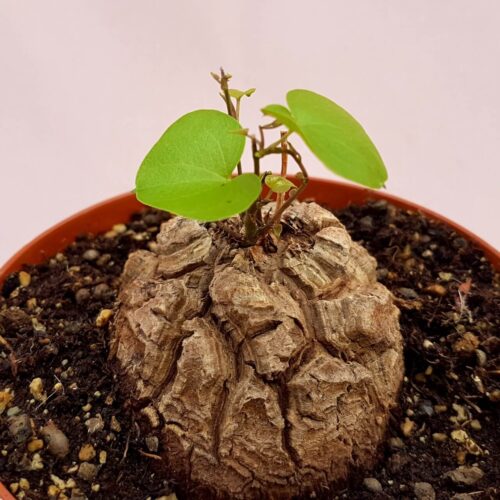| Origin | Madagascar |
|---|---|
| Family | Dioscoreaceae |
| Exposure | Direct sun at least half a day from early spring to autumn. Come back when the temperature approaches ten degrees. |
| Watering | Regular (every 10 days) from spring to late summer. Check that the earth is completely dry before watering again. Suspend if the plant completely loses its leaves (vegetative rest). |
| Fertilization | In spring |
Dioscorea elephantipes Ø 10,5 cm
Belonging to the family of Dioscoreaceae, this Dioscorea elephantipes plant is supplied in a Ø 10,5 cm pot with a label indicating its botanical name.
The Dioscorea elephantipes is a tropical plant belonging to the Dioscoreaceae family, renowned for its extraordinary botanical characteristics. Sought after both for its unique appearance and its potential uses, this species is garnering increasing interest in the fields of botany and agriculture. Its cultivation, still relatively uncommon in some parts of the world, represents an intriguing opportunity for enthusiasts of exotic plants and for those looking to explore new frontiers in gardening.
Botanical characteristics
This plant stands out for its large, heart-shaped leaves, which can reach considerable sizes, creating a dense and lush canopy. The flowers, which bloom in clusters, display shades ranging from white to green, while the tubers are particularly fascinating due to their peculiar shape and ability to store nutrients. Classified within the Dioscorea genus, the Dioscorea elephantipes originates from the tropical regions of Africa and Asia, thriving in subtropical habitats. Additionally, the plant adapts well to well-drained soils, where it can develop optimally.
Cultivation
When it comes to cultivating Dioscorea elephantipes, it is essential to consider some key aspects. First, the ideal soil for its growth should be sandy and well-drained, avoiding waterlogging that could harm the plant. Light exposure is equally important: it prefers bright environments, although it can tolerate a few hours of partial shade. Watering should be regular but not excessive, ensuring proper hydration, especially during active growth periods. Finally, the application of nutrient-rich fertilizers is recommended to promote tuber development, with frequency varying depending on the specific soil conditions and the plant’s growth.
Curiosities
The Dioscorea elephantipes is not only an example of botanical beauty but also plays a significant role in the local culture of some areas. In various traditions, the tubers have been used not only in cooking but also for their medicinal potential, although a cautious approach is always advisable when exploiting plants for therapeutic purposes. Recently, the plant has gained more attention for its potential use in sustainable agriculture projects, proving to be a valuable ally in the conservation of tropical biodiversity.
In conclusion, the Dioscorea elephantipes presents itself as an interesting and versatile choice for those looking to delve into the world of tropical plants. Whether for cultivation, research, or simple botanical curiosity, this plant deserves to be known and appreciated. It is thus an invitation to further explore the potential of this species and, why not, to share cultivation experiences with other enthusiasts or experts in the field.
€32,00









